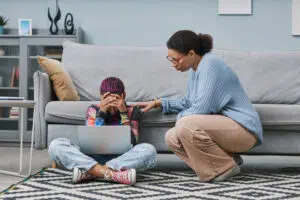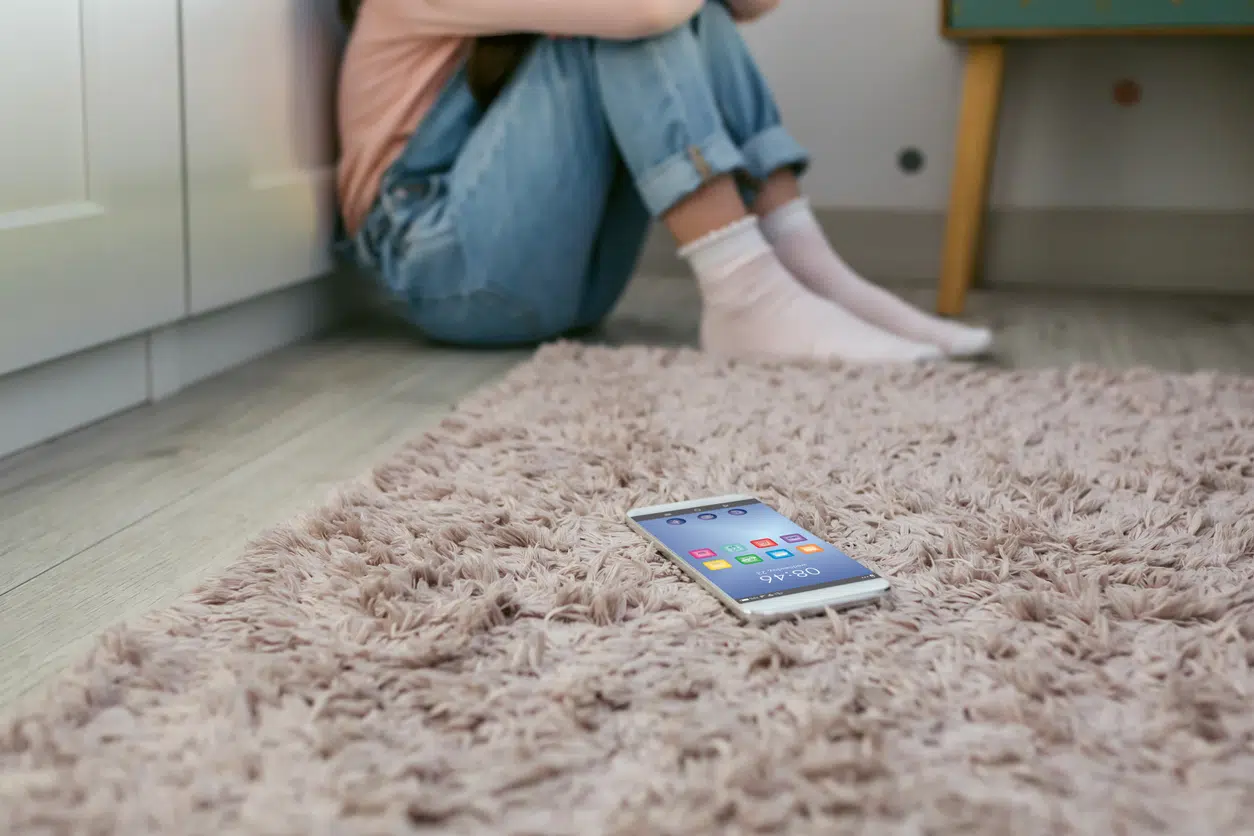‘We lost our daughter to cyberbullying.’
McKenna Brown was an accomplished hockey player and scholar, known for her kindness, when she became the target of intense cyberbullying from her peers in high school. Her parents, Hunter and Cheryl, are now trying to raise awareness about the potentially devastating consequences of cyberbullying after the behaviors escalated and McKenna took her own life, according to an article in the Tampa Bay Times.
“Our daughter was bullied during her freshman year via texts and Snapchat. Then the week before her senior year was to start, she was bullied again via texts, Snapchat, Instagram and, likely, TikTok. The relentless attacks culminated with some of her teammates/friends/classmates sharing the fact that our daughter had been raped at the age of 14, as well as what we believe was an attempt to ‘cancel’ her via text, phone and social media,” according to the article.
“The memories of bullying from her freshman year, exacerbated by the breadth and speed of social media, likely took a toll on her young soul, and she took her own life in August 2022. As parents, we believed we had done everything we could do. We engaged in our children’s lives, emphasized the importance of a good education and instilled values of compassion and resilience. They excelled academically, socially and athletically. Yet, our efforts were powerless against the rapidity and reach of online toxicity that our daughter faced. The tools we had to protect her were inadequate against the sophisticated, far-reaching, rapidly spreading and pervasive threats of the digital age.”
Cyberbullying: Unique Challenges and Impacts
 Experts say cyberbullying is important enough to take seriously because its impact can be even more damaging in young people than traditional bullying, with troubling psychological effects.
Experts say cyberbullying is important enough to take seriously because its impact can be even more damaging in young people than traditional bullying, with troubling psychological effects.
According to the America Psychological Association (APA) website, cyberbullying can happen anywhere young people can connect to the internet or receive a text:
“Cyberbullying occurs when someone uses technology to demean, inflict harm, or cause pain to another person. It is ‘willful and repeated harm inflicted through the use of computers, cell phones, and other electronic devices.’ Perpetrators bully victims in any online setting, including social media, video or computer games, discussion boards, or text messaging on mobile devices.”
What cyberbullying looks like
According to a 2022 report from the Pew Research Center, their report measured “cyberbullying” as teens being targeted by the following actions
- “Offensive name-calling
- Spreading false rumors about them
- Receiving explicit images they didn’t ask for
- Physical threats
- Constantly being asked where they are, what they’re doing, or who they’re with by someone other than a parent
- “Having explicit images of them shared without their consent”
According to the APA website, “One bully can harass another person online or several bullies can gang up on an individual. While a stranger can incite cyberbullying, it more frequently occurs among kids or teens who know each other from school or other social settings. Research suggests bullying often happens both at school and online.”
Why cyberbullying can be so damaging
The hard-to-escape nature of cyberbullying may be why it can weigh so heavily on young people, according to experts in a Parents article.
“Any type of bullying can have physical and psychological effects on a child. Anxiety, fear, depression, low self-esteem, behavioral issues, and academic struggles are just of the few challenges kids may experience if they are targets. Cyberbullying, however, may be particularly damaging.
There are several possible reasons for this. For example, unlike traditional bullying—which is often limited to school and known bullies—cyberbullying can occur at any time, day or night, and be perpetrated by anonymous sources. This makes it more relentless and, often, crueler.
While cyberbullying can happen in a public digital space, like in social media posts, it can also take the form of private messages—leaving some kids managing this secret, and its effect on them, alone. Being aware of all the effects of cyberbullying cannot only help you support a child you know is affected, but help you become more aware of signs that may be reason for concern—and a conversation,” according to the article.
The psychological effects of cyberbullying

“When cyberbullying is ongoing, victims may relate to the world around them differently than others. For many, life can feel hopeless and meaningless. They may lose interest in things they once enjoyed and spend less time interacting with family and friends. And, in some cases, depression and suicidal ideation can set in,” according to the article.
The Parents article notes that mental health effects that young people may face from cyberbullying mayinclude the following:
- Depression and anxiety
- Low self-esteem
- Academic issues
- Suicidal ideation and self-harm
Some victims may also show physical changes, such as stomach problems, disordered eating or sleep disturbances. Parents should seek help from a healthcare provider if they notice these changes in their children, according to the article.
Preventing cyberbullying
According to the APA website, educating parents, young people and others about cyberbullying, and taking other measures, may help lessen its harmful effects.
“Many studies show preventative measures can drastically reduce cyberbullying perpetration and victimization. Parents and caregivers, schools, and technology companies play a role in educating kids about media literacy and mental health. Psychologists—thanks to their expertise in child and teen development, communication, relationships, and mental health—can also make important contributions in preventing cyberbullying.”
Many parents are also urging lawmakers for stricter controls to help create a safer digital world. For example, McKenna’s parents are involved in championing the Kids Online Safety Act (KOSA) of 2023, along with many other families.
“McKenna’s story is sadly not just ours; it mirrors the silent cries of many families across Florida and the nation. The internet is a boundless frontier of knowledge and connection. It is a place that can truly empower kids and help them flourish with access to endless information and culture. Sadly, it has also become a battleground where our children are left vulnerable.
We were told that what happened to McKenna did not meet the threshold for a charge of stalking. The teammates who chose to ‘cancel’ McKenna via social media took her personal, private information and her most closely guarded secret and made them public. They promised her the embarrassment of ‘everyone else knowing’ – yet they will go unpunished. The last time Congress passed a law to protect children online was 25 years ago. Meanwhile, the complexity and pervasiveness of social media platforms continues to evolve, bringing with it new potential harms,” according to the Tampa Bay Times article.
Resources
Supporting kids who are cyberbullied may take different forms depending on the behaviors, according to the Parents article. It may include reporting the cyberbullying to social media companies, or school or law enforcement officials as appropriate, and becoming familiar with the laws surrounding these issues.
“In the meantime, do not dismiss your child’s feelings. Do what you can to make them feel empowered. Communicate with them daily and keep close tabs on changes in mood and behavior. Seek the help of a health care professional if you notice any changes at all,” according to the article.
Given the potentially harmful health effects of cyberbullying, these issues should be taken seriously, according to the APA website.
“Because cybervictimization coincides with anxiety and depression, research suggests mental health clinicians and educators should consider interventions that both address adolescents’ online experiences and support their mental, social, and emotional well-being. Psychologists can also help parents speak to their kids about cyberbullying, along with supporting families affected by it.”
To learn more about cyberbullying, you can visit the following resources, according to the APA website:
Our articles are for informational purposes only and are reviewed by our Medical Information team, which includes PharmDs, MDs, and PhDs. Do not make any changes to your current medications or dosing without consulting your healthcare provider.
The GeneSight test must be ordered by and used only in consultation with a healthcare provider who can prescribe medications. As with all genetic tests, the GeneSight test results have limitations and do not constitute medical advice. The test results are designed to be just one part of a larger, complete patient assessment, which would include proper diagnosis and consideration of your medical history, other medications you may be taking, your family history, and other factors.
If you are a healthcare provider and interested in learning more about the GeneSight test, please contact us at 855.891.9415. If you are a patient, please talk with your doctor to see if the GeneSight test may be helpful.






